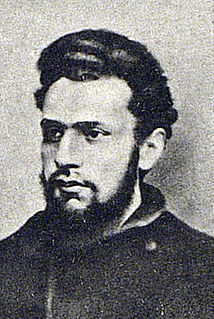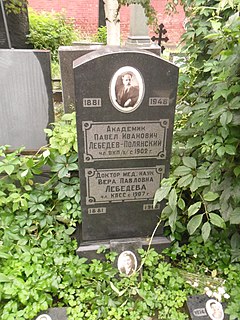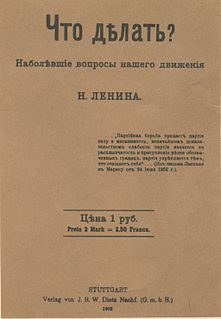
Leninism is the political theory for the organisation of a revolutionary vanguard party and the achievement of a dictatorship of the proletariat as political prelude to the establishment of socialism. Developed by and named for the Russian revolutionary Vladimir Lenin, Leninism comprises socialist political and economic theories, developed from Marxism and Lenin's interpretations of Marxist theories, for practical application to the socio-political conditions of the Russian Empire of the early 20th century.

The State and Revolution (1917), by Vladimir Lenin, describes the role of the State in society, the necessity of proletarian revolution, and the theoretic inadequacies of social democracy in achieving revolution to establish the dictatorship of the proletariat.

Alexandr Martynov was a Menshevik before the Russian revolutions of 1917, and for a few years after the revolution a critic of the Soviet government's theory of permanent revolution (1923).
League of Russian Revolutionary Social-Democracy Abroad was a Russian emigre political organisation, founded by Lenin in October 1901. The Iskra organisation abroad and the Sotsial-Demokrat revolutionary organisation united to form the League. The League's task was to disseminate the ideas of revolutionary Social-Democracy and promote militant revolutionary Social-Democracy.
Golos Sotsial-Demokrata was a Russian-language publication, issued by a section of exiled Mensheviks.
Union of Russian Social-Democrats Abroad was an organization of emigrant Russian socialists, set up in Geneva in 1894 on the initiative of the Emancipation of Labour group. It had its own printing press for issuing revolutionary literature, and published the newspapers Rabotnik and Listok Rabotnika. Initially, the Emancipation of Labour group directed the Union and edited its publications. But afterwards opportunist elements gained the upper hand within the Union.
The Neutral Group of Social-Democrats in Berlin was a group of exiled Russian Social Democrats in Berlin, formed round V. A. Bazarov in the autumn of 1900 and set itself the task of healing the split between the supporters of Rabocheye Delo and the Emancipation of Labour group after the Second Congress of the Union of Russian Social-Democrats Abroad. Among its members were also M. G. Vecheslov and I. B. Basovsky. According to Bazarov, the group sent its representatives to Geneva in early 1900 to persuade the Iskra and the Sotsial-Demokrat organisation to be reconciled with the Union. The group issued three or four political proclamations and was disbanded in the summer of 1901.
The Jewish Social Democratic Party was a political party in Galicia and later also Bukovina, established in a split from the Polish Social Democratic Party of Galicia (PPSD) in 1905. The party made its first public appearance on May 1, 1905, with separate May Day rallies in Kraków, Lemberg, Tarnów and Przemyśl. However, as the new party stressed that it was not a competitor of the existing Social Democratic parties, they later joined the PPSD celebrations.
Sbornik Sotsial-Demokrata was a Russian publication. It was published under Lenin's direct supervision by the editorial board of Sotsial-Demokrat, the central organ of the Russian Social Democratic Labour Party (Bolsheviks). However, only two issues appeared, one in October 1916 and another in December the same year. The first issue contained an article by Karl Radek on the national question, and a reply from Lenin. The third issue was never published due to lack of funds.
Zionist-Socialist Workers Party, often referred to simply as Zionist-Socialists or S.S. by their Russian initials, was a Jewish socialist territorialist political party in the Russian Empire and Poland, that emerged from the Vozrozhdenie (Renaissance) group in 1904. The party held its founding conference in Odessa in 1905.

The 5th Congress of the Russian Social Democratic Labour Party was held in London between May 13 and June 1, 1907. The 5th Congress had the largest attendance of the Congresses of the unified RSDLP. Thirty-five sessions of the Congress were held in the Brotherhood Church in Hackney, during which stormy debates took place.

Arkadi Kremer was a Russian socialist leader known as the 'Father of the Bund'. This organisation was instrumental in the development of Russian Marxism, the Jewish labour movement and Jewish nationalism.

Osip Solomonovich Minor was a Russian revolutionary and member of the Socialist-Revolutionary Party.

Pavel Ivanovich Lebedev-Polianskii was Bolshevik revolutionary and later state functionary and literary scholar.

What Is To Be Done? Burning Questions of Our Movement is a political pamphlet written by the Russian revolutionary Vladimir Lenin in 1901 and published in 1902. Lenin said that the article represented "a skeleton plan to be developed in greater detail in a pamphlet now in preparation for print". Its title is inspired by the novel of the same name by the 19th century Russian revolutionary Nikolai Chernyshevsky.
The Mensheviks were a faction in the Russian socialist movement, the other being the Bolsheviks.
The 2nd Congress of the Russian Social Democratic Labour Party was held during July 30–August 23 1903, starting in Brussels, Belgium and ending in London. Probably as a result of diplomatic pressure from the Russian Embassy, Belgian police had forced the delegates to leave the country. The congress finalized the creation of the Marxist party in Russia proclaimed at the 1st Congress of the RSDLP.

The Russian Social Democratic Labour Party, also known as the Russian Social Democratic Workers' Party or the Russian Social Democratic Party, was a revolutionary socialist political party founded in Minsk, Belarus.

The St. Petersburg League of Struggle for the Emancipation of the Working Class was a Marxist group in the Russian Empire. It was founded in St. Petersburg by Vladimir Lenin, Julius Martov, Gleb Krzhizhanovsky, Anatoly Vaneyev, Alexander Malchenko, P. Zaporozhets, V. Starkov and others in the autumn of 1895. It united twenty different Marxist study circles, but Lenin dominated the league through the 'central group'. Its main activity was agitation amongst the workers of St Petersburg and the distribution of socialist leaflets to the factories there.

Anti-Leninism is opposition to the political philosophy Leninism as advocated by Vladimir Lenin.











